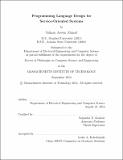| dc.contributor.advisor | Sepandar D. Kamvar. | en_US |
| dc.contributor.author | Ahmad, Salman Azeem | en_US |
| dc.contributor.other | Massachusetts Institute of Technology. Department of Electrical Engineering and Computer Science. | en_US |
| dc.date.accessioned | 2015-01-20T15:30:04Z | |
| dc.date.available | 2015-01-20T15:30:04Z | |
| dc.date.copyright | 2014 | en_US |
| dc.date.issued | 2014 | en_US |
| dc.identifier.uri | http://hdl.handle.net/1721.1/92961 | |
| dc.description | Thesis: Ph. D., Massachusetts Institute of Technology, Department of Electrical Engineering and Computer Science, 2014. | en_US |
| dc.description | This electronic version was submitted by the student author. The certified thesis is available in the Institute Archives and Special Collections. | en_US |
| dc.description | Cataloged from student-submitted PDF version of thesis. | en_US |
| dc.description | Includes bibliographical references (pages 179-187). | en_US |
| dc.description.abstract | Designing systems in a service-oriented manner, in which application features are decoupled and run as independently executing services over a network, is becoming more commonplace and popular. Service-oriented programming provides a natural way to model and manage many types of systems and allows software development teams to achieve operational flexibility, scalability, and reliability in a cost-effective manner. In particular, it has been used quite successfully for Web and mobile applications. However, building, deploying, and maintaining service-oriented systems is challenging and requires extensive planning, more effort during development, a detailed understanding of advanced networking techniques, and the use of complicated concurrent programming. This thesis presents a new programming language called Silo. Silo integrates features that address key conceptual and pragmatic needs of service-oriented systems that, holistically, are not easily satisfied by existing languages. Broadly, these needs include: a unified distributed programming model, a simple yet ecient construct for concurrency, a familiar yet extensible syntax, and the ability to interoperate with a rich ecosystem of libraries and tools. In this dissertation, I describe how Silo's features, constructs, and conventions satisfy these needs. Then, I present various compiler and runtime techniques used in Silo's implementation. Lastly, I provide a demonstration, through a variety of programming patterns and applications, of how Silo facilitates the design, implementation, and management of service-oriented systems. | en_US |
| dc.description.statementofresponsibility | by Salman Azeem Ahmad. | en_US |
| dc.format.extent | 187 pages | en_US |
| dc.language.iso | eng | en_US |
| dc.publisher | Massachusetts Institute of Technology | en_US |
| dc.rights | M.I.T. theses are protected by copyright. They may be viewed from this source for any purpose, but reproduction or distribution in any format is prohibited without written permission. See provided URL for inquiries about permission. | en_US |
| dc.rights.uri | http://dspace.mit.edu/handle/1721.1/7582 | en_US |
| dc.subject | Electrical Engineering and Computer Science. | en_US |
| dc.title | Programming language design for service-oriented systems | en_US |
| dc.type | Thesis | en_US |
| dc.description.degree | Ph. D. | en_US |
| dc.contributor.department | Massachusetts Institute of Technology. Department of Electrical Engineering and Computer Science | |
| dc.identifier.oclc | 899983837 | en_US |
